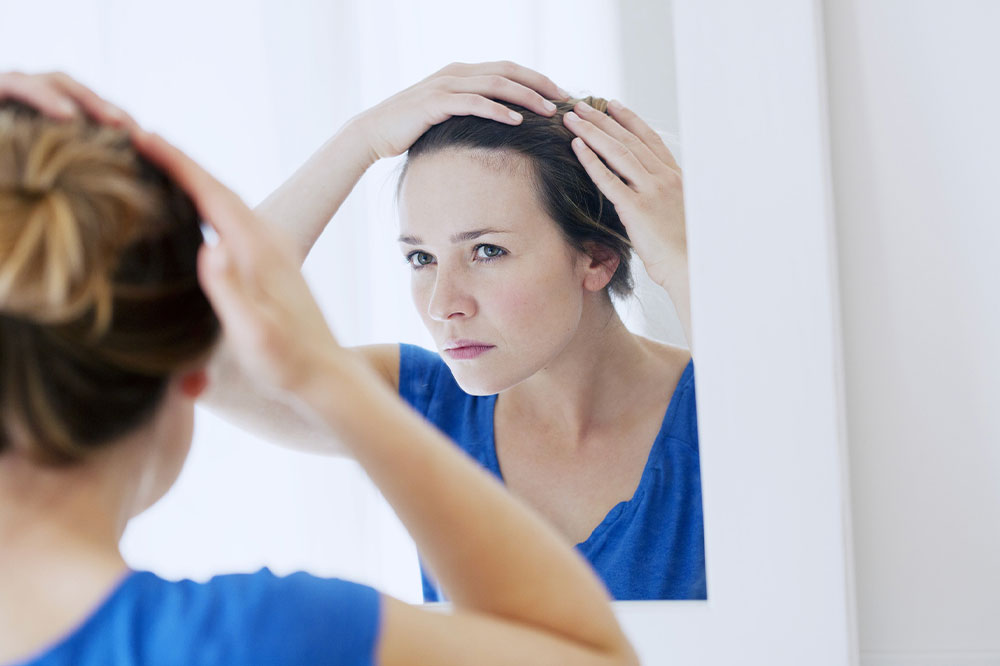Hair loss and natural care tips to manage it
Are you losing sleep over hair fall? If yes, you are not alone. Our hair is one of the most prized assets that we take pride in and care for. So when it starts thinning, we hit the panic button. This article will throw new light on the way our hair grows, what makes it fall out, and the steps that you can take to manage hair loss. Read on to know more!

What is hair loss?
Before we give you some expert tips on the management of hair loss, let’s understand what exactly hair loss is.
There are thousands of hair strands on your head, and you lose some every day. According to the American Academy of Dermatology Association, it is normal to shed between 50 to 100 strands of hair each day. This happens while you shampoo, comb, or even while you sit still.
But if you are experiencing more hair fall than this, you may be going through hair loss. Some common triggers for the condition are genetics, gender, pregnancy, chronic stress and anxiety, and long-term dependence on prescription treatment.
It is usually characterized by large clumps of hair falling out and bald patches.
Tips to manage hair loss
Now that you know what causes hair loss, here are some simple and effective hair loss prevention tips to tide you through:
Get more protein
Every strand and follicle of your hair is made up of a kind of protein known as keratin. This protein is the building block for healthy hair and helps your hair grow stronger. Without adequate intake of protein, your hair tends to fall out.
The amino acids in proteins are essential for healthy hair growth. You need to include both animal and plant-based proteins in your meal plans. Some of the best sources of proteins include bone broths, meats such as lamb, duck, shellfish, chicken, and turkey, eggs, cottage cheese, plant-based milk, nuts and seeds, and yogurt.
Stay hydrated
Did you know that dehydration does more than just leave you fatigued? Just like your body and skin, water is the lifeline for your hair too. Not drinking enough water makes your hair dry, weak, and frizzy. All this makes it break faster, leading to more hair loss. Dehydration also makes your scalp dry, leading to hair fall-inducing conditions such as dandruff. Every shaft of your hair is one-fourth water. Water lubricates your hair inside and out by optimizing your circulation. This allows your follicles to gain nutrition and stimulate hair growth.
Ideally, your water intake must be between eight to ten glasses every day. However, plain water may feel boring to some. Hence, apart from drinking plain water, you can include interesting flavors in your routine. You can drink coconut water, green tea, smoothies, etc., to increase your fluid intake. Or choose fruits and veggies with higher water content. These include cucumbers, watermelons, plums, peaches, strawberries, etc.
Try essential oils
One of the most effective natural care tips for managing hair loss is including essential oils in your routine. These are oils that are extracted from plants and carry the unique essence, flavor, and properties of that particular plant.
One essential oil that shows a lot of promise when it comes to hair growth is jojoba oil. This is the oil of the jojoba plant that has been used for centuries for treating various ailments, hair loss being one of them. The product has inflammatory properties that help restore hair health and promotes new hair growth. Other essential oils that are said to promote hair growth include peppermint, lavender, ginseng, and Chinese hibiscus.
The bottom line
Hair loss is a common occurrence that may happen to anyone at any age. The best way to combat this problem is to make appropriate lifestyle changes. Eat balanced meals, including hair-healthy ingredients, exercise regularly, quit any dependence on toxic substances, and reduce stress and anxiety. Avoid using too many products that may contain harmful chemicals that may lead to further hair loss. If you still cannot control the condition and it is gradually worsening, contact your dermatologist to find the best possible solution.

